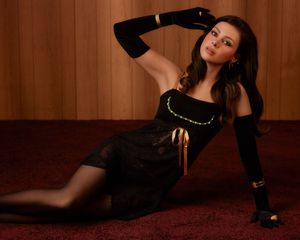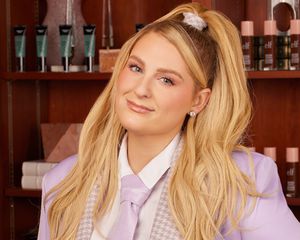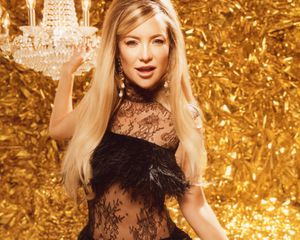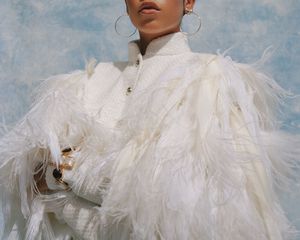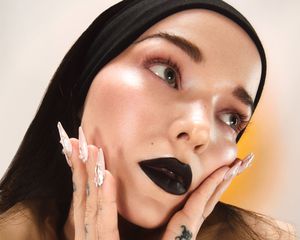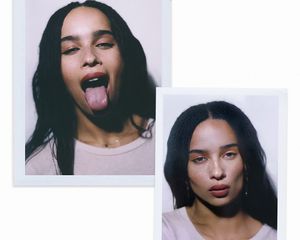If you've watched The Serpent, you know it's one of the most thrilling true crime dramas to hit Netflix. The eight-episode series follows French serial killer Charles Sobhraj, who notoriously robbed and killed over a dozen tourists in South and Southeast Asia throughout the 1970s. Sobhraj's motive was to steal his victims' passports and identities, travel the world, and sell stolen gems. And for a significant portion of Sobhraj's murdering spree, his girlfriend, Marie-Andrée Leclerc (who he renames Monique), was in tow to follow his every twisted instruction. Played by English actress Jenna Coleman, Sobhraj's female accomplice is one of the most fascinating characters to dissect.
When Coleman received the script for The Serpent, the complicated darkness of the story and the dual nature of her character immediately drew her in. How complicit was she? How much of a victim was she? These were the questions Coleman found herself brewing on as she stepped into the world of Leclerc. "Her psychology felt so complicated and unusual," Coleman says. "She's like nobody I've ever encountered before, so I tried to crack that open and understand her. The real-life story blows my mind." Ahead, Coleman discusses the complexities of Marie-Andrée Leclerc, shaping the '70s beauty and style aesthetic of her character, and the wellness practices that help her feel her best.
The Serpent is one of the most talked-about Netflix series as of late. What made you want to join the cast?
I determine what roles I take on very instinctively during a script read. When The Serpent came along, I was doing All My Sons with Sally Field and Bill Pullman over at The Old Vic. That's set in 1940s Ohio, very suburban America. With The Serpent, it was set in 1970s Bangkok. They sent through all these visuals along with the script since it's a real-life story. The images looked so filmic and so strong. I couldn't believe it was not already a film. And the story in itself was so intoxicating and seductive. Someone once said this about The Serpent: "It's almost like you can't stop looking at it. You can't stop being drawn in by the story, but I don't like how it makes me feel." I thought that was such a good way to sum it up because it has this intoxicating and dark nature, but you also can't help but go on this exotic journey as well. I was hooked [when I read the script] and really wanted to work with Tahar Rahim as well. So, I was straight on a plane over to Bangkok. And a few weeks later, we began shooting.
I want to dive deeper into the complexities of your character. What was it like stepping into her world?
It was quite an anxiety-inducing experience. She's a very internal, introspective character. So much of her is held in suspense all of the time. But I had all of her diary excerpts, and there are loads of biographies. I also had real-life recordings of her speaking from prison. So, I could hear her voice. Her diaries felt dark, tortured, and darkly romantic. She almost lives in a completely different reality to what was actually going on. She creates her own narrative all of the time. She created her fake world and narrative of that situation so that she could exist there. The reality was he's a killer, and he's very manipulative. They were in Kanit House, and he was seducing people, robbing them, and drugging them. And to her, she was living the biggest romantic story of her life. So with those things against each other, I found it so interesting.
She's so complicated and dark. There was a lot of her internal world to play with. Every scene felt so complicated. I'm still fascinated by her. I think me and Tahar were really sad to give up the characters. There was a bit of a grief process afterward.
Jenna Coleman/Design by Tiana Crispino
In addition to stepping into her inner world, you had to shape her outer appearance. Can you kind of talk about what it was like developing her beauty and style aesthetic?
That part was so integral. It's so important because, in addition to constructing her narrative, she's also constructing who she is to the world. And it isn't who she is inside. The costume and makeup journey were really interesting because there's a duality. The Monique that Charles Sobhraj created is this glamorous character. The real Marie-Andrée is an inexperienced girl who'd never traveled before. She used to work at an orthopedic surgery office as a receptionist. She had a limp and was quite shy. So, I was playing those two characters molded in one. She transforms immensely—what she was feeling mentally reflected in how she puts herself across the world.
We had lots of conversations at the beginning in terms of Monique. She had those oversized '70s shades. We spoke a lot about a Brigitte Bardot, but like a dark Brigitte Bardot. We always wanted her to be hiding behind her hair because she didn't want to be seen. We put her in really floaty Kimonos. She was always reading those 1970s Vogue magazines and wanted to be those women because she didn't want to be herself. And then, obviously, she reverts to this very devout Catholic "good girl" from Quebec with her plimsolls, bushy hair, and her glasses. It's like she has a lack of awareness of her sexuality.
As you go through the series, she becomes more comfortable in this [Monique] persona. So, we started looking at images of Bianca Jagger and tapping into more of that rockstar gangster moll imagery. The makeup became a little bit more like well-to-do instead of the kohl eyeliners. And as she falls apart towards the end of the series, we wanted all the makeup to look like she slept in it the night before. At the end of the series, she ends up looking like Mother Teresa. The character's transformation visually was so integral to every stage of where the character was emotionally.
You've been in the entertainment industry since 2005. How would you say you've evolved personally and professionally throughout that time?
My first job was when I was 19. So, I think there's a certain element where you get used to being on a set. [You learn] how to operate on a set and how to feel confident in terms of having your voice while always remaining open. It's such a balance. But one of the best parts about the job is finding creatives like our director, Tom Shankland and Tahar Rahim. That was such a dream team for me because it felt very collaborative, experimental, and free. I think that's the best when a director trusts you and you feel confident. So, I guess finding the confidence in my voice on a set so that I can be free has been a bit of an evolving process for me. It's an ever-evolving process that I don't think will ever stop. The best actors in the world that I've worked with and the people that I really look up to are the ones that are still asking questions and being curious at 50 or 60 years old.
Do you have any advice for people wanting to break into the industry?
Keep looking outward a lot. As an actor, there's this massive tendency to watch yourself back and look at images. There's so much that's inward-looking. One of the most important things as an actor is always to look outward to be creative. And it's important to be playful as well. Play is the key to creativity. You can never lose that childish sense of play. Also, I didn't go to drama school. Especially in this country, that was the way you get agents and how you get jobs. And this is still a lesson for me, but through iPhones and self-tapes, there are new ways to create a platform for yourself. You don't have to wait to get a role. You can create something yourself. There are so many ways to keep learning and being creative.
:max_bytes(200000):strip_icc()/zoomdate-JennaC-recirc-square-2d79e7fa72b04b32bb030413869bd7e6.jpg)
Jenna Coleman/Design by Tiana Crispino
Let's talk about your beauty routine. What are some of your go-to products and tricks?
In Bangkok, I started using Biologique Recherche. Their products have transformed my skin. The cheapest, simplest, and probably most powerful [beauty tip] I've ever been told is to use ice cubes on my face. I'm not religious enough to do it all the time. But when I remember to do it, I see the benefits. I'm very low maintenance when I'm at home. If I'm going out, I love going for a romantic gothic vibe [with my makeup]. So I'll wear very soft pinks and a lot of chocolate browns.
Do you have any favorite brow products? Your brows are beautiful.
I've got very big brows. I experimented with getting them laminated the other day. My grandma told me I would look like the father in Schitt's Creek [laughs]. Other than that, I tweeze them a little bit.
Jenna Coleman/Design by Tiana Crispino
When you have downtime from filming, what are you doing for self-care?
I take an Epsom salt or magnesium bath. I could spend two hours in a bath. I've dipped in and out of meditating. I find that yoga, in particular, is great to me just in terms of my breath and anxiety. It seems to settle my nervous system. I'm also an early morning person. I love to get up at like 5 or 6 AM and have that quiet time in the morning. That sets me up for the rest of the day. I try to do a workout then, so I'm done by 9 AM. I've also experimented with a sauna blanket. I'm very much into health hacks. In the UK, it's so dark and cold during the winter, so I would get into a sauna blanket and put on a podcast. In a way, I guess that's been my form of meditation.
Everyone has been binge-watching The Serpent. What shows are you watching these days?
I don't know if it's out in The States yet, but I've watched Pursuit of Love. Emily Mortimer directed it, and it features Lily James and Emily Beecham. I'm going to start watching Halston tonight. I've also been watching many award circuit films like Nomadland and Portrait of a Lady on Fire. Normal People was the big thing here during the lockdown, and Billie Piper's I Hate Suzie.
What are you looking forward to this year?
Connecting with people. That's beginning to happen here. It's been this massive year of stillness and reflection. The sense of time has become very elastic. So, communicating, socializing, and being with people again feels like such a buzz. I did this indie film a few weeks back, and we all got locked in together. It filled me up so much because everyone's been so alone and isolated. I think 2021 will be the year of people.
:max_bytes(200000):strip_icc()/ZoomDate-Article-SF-JennaC-e719499ebb044ee0b1ecb16e14e0e6db.jpg)
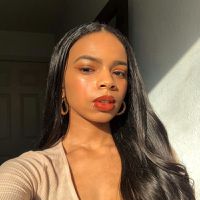
:max_bytes(150000):strip_icc()/ZoomDate-JennaC-HomePage-SF-e55bba4c7c2440719b96c5e09f138f38.jpg)
:max_bytes(150000):strip_icc()/ZoomDate-JennaC-EMBED-1-39b7498f6da0446a926cee9ef667a3af.jpg)
